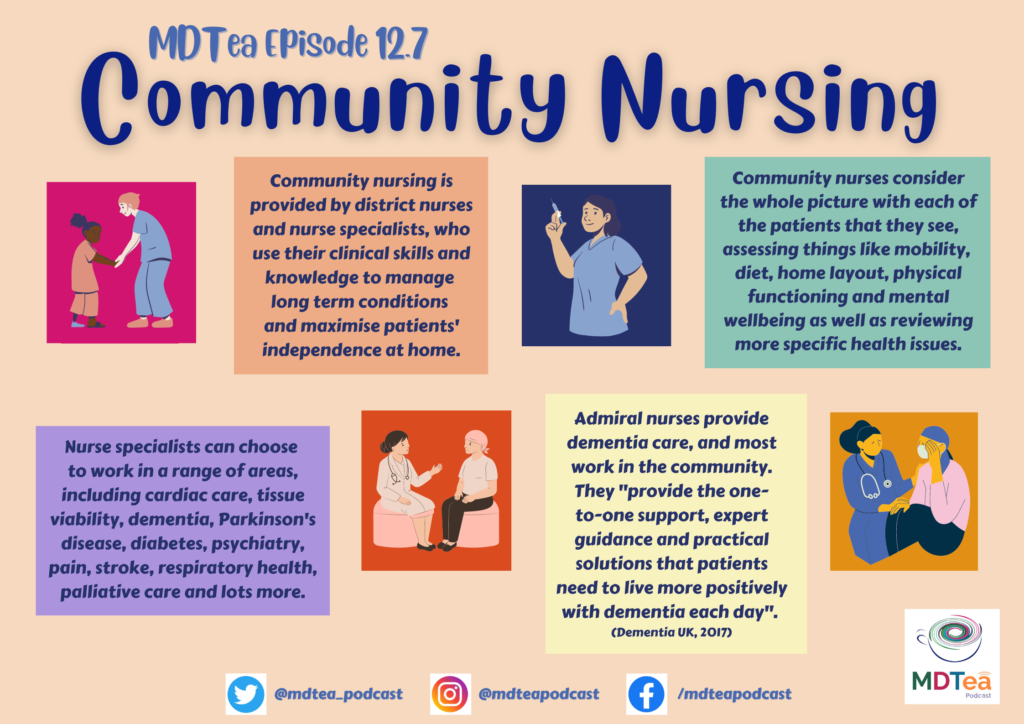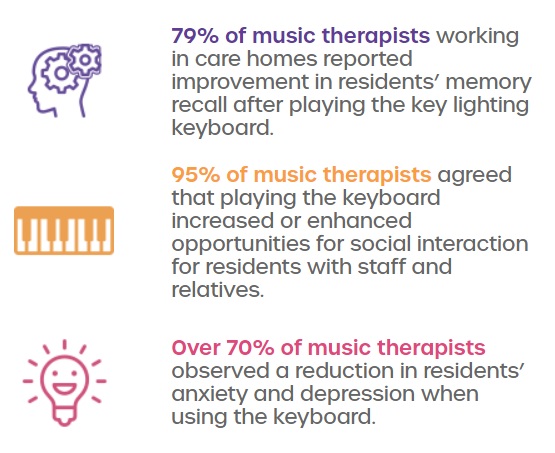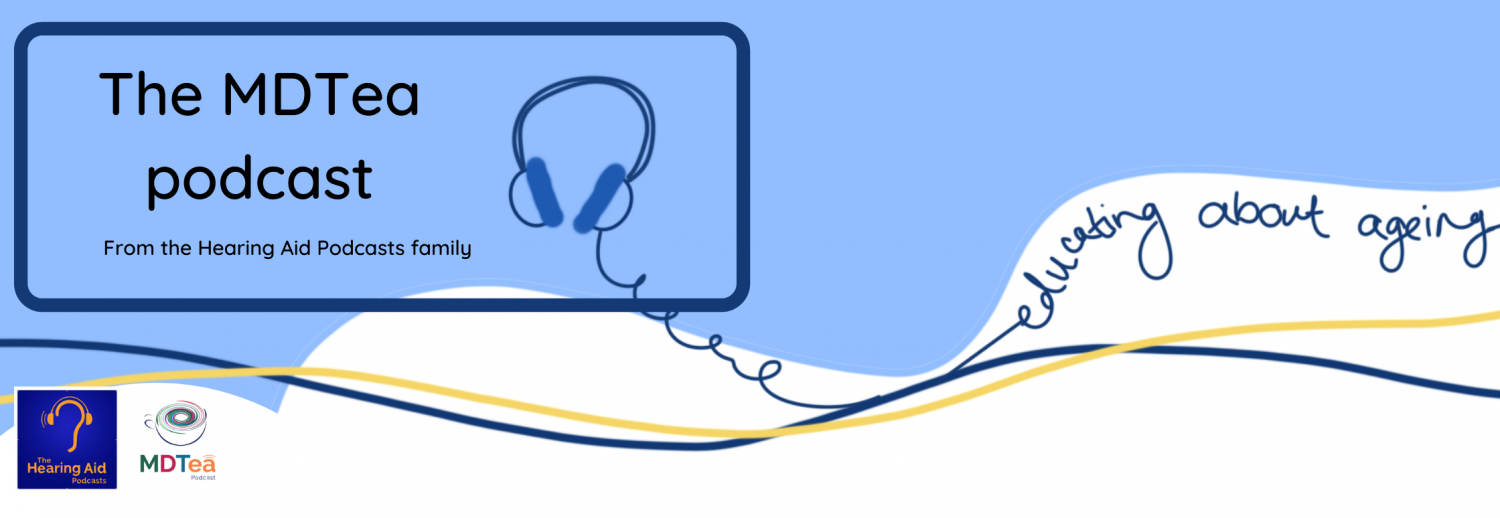12.7 Community Nursing
Presented by: Iain Wilkinson, Jo Preston and Stephen Collins
Special Guests: Clare Addison and Chris O’Connor
Broadcast date: 18th October 2022

The MDTea Podcast is supported by the British Geriatrics Society
Learning Outcomes
Knowledge:
- To understand that nursing in the community is a multi-faceted thing, that can range from district nurses more generally to specialist nurses focusing on things such as Parkinson’s disease, dementia, diabetes, tissue viability and lots of other things too.
Skills:
- To recognise the expert skills that are brought to community care by nurses in different roles.
- To see how important community nurses are in terms of their close attention and care enabling patients to stay in their home environment for as long as possible.
Attitudes:
- To highlight the multiple different nurses that a patient like Jean might encounter.
- To show the opportunities that are available for nurses with specialist interests who might be listening to this and are working in community healthcare.
- To recognise the dignity that community nurses show to older patients, and the personalised care they provide to make sure the later life of elderly people in the community is as enjoyable and fulfilling as possible.

Paper of the Week
Stevens, Price and Walker, Making the mundane remarkable: an ethnography of the ‘dignity encounter’ in community district nursing, Ageing & Society (2021) – https://www.cambridge.org/core/journals/ageing-and-society/article/making-the-mundane-remarkable-an-ethnography-of-the-dignity-encounter-in-community-district-nursing/86BC2FDDE1A7AE21426EDDE9EA4425EA
Some facts about community nursing
District nursing is mainly provided in patients’ homes and sometimes
clinics or GP surgeries. The district nursing team does not work in isolation but contributes to the wider multidisciplinary team that supports patients with care needs living in the community – https://www.qni.org.uk/wp-content/uploads/2021/11/Capital-Nurse-Community-Factsheet.pdf
District nurses assess people to see how to provide nursing care that allows people to remain in their own homes, maintain their independence, or have additional support after hospital discharge. District nurses can provide wound care, support catheter care, and administer complex medication within a patient’s home as well as immunisations. As well as treatment, they can offer advice and support with health concerns and refer to other organisations – https://qni.org.uk/nursing-in-the-community/work-of-community-nurses/district-nurses/
Admiral Nurses are specialist dementia nurses, who help families manage complex needs, considering the person living with dementia and the people around them. They help people living with dementia stay independent for longer – and support the people caring for them. They work in local community services, GP practices and NHS hospitals, care homes, and hospices – https://www.dementiauk.org/get-support/what-is-an-admiral-nurse/

How might community nurses help Jean?
- Parkinson’s specialist nurse reviews Jean on a regular basis, to manage her medications and see if there has been any progression of her PD symptoms.
- PD nurses assess symptoms like rigidity/swallowing/mobility – and arrange additional support for Jean when needed.
- Dementia nurse review – to carry out an assessment of Jean’s cognitive decline. What aspects of her dementia need to be managed? Is she becoming agitated or restless? Is her sleep suffering? Has she experienced low mood? Any hallucinations of worsening confusion? What type of dementia has she, and can it be managed with lifestyle interventions or even with medications?
Jean’s dementia nurse may also look at whether or not music therapy might be beneficial for Jean. A new study called ‘Light Up My Life’ by Music and Dementia in September 2022 showed that following a piano playing intervention 79% of music therapists reported improvement in memory and recall in care home residents living with dementia, 95% noted how it increased or enhanced opportunities for social interaction, and over 70% observed a reduction in anxiety and depression – https://www.casio.co.uk/emi/lightupmylife/learnmore

Social Media this week...
Jo: TikTok account from the fitness and exercise instructor, Jackie Rox 64, who produces regular videos focusing on positive ageing and helping her online followers to stay fit, mobile and active regardless of their age. In her bio, she says she aims to “show 60+ ladies that age is no barrier to trying new things”
Curriculum Mapping
NHS Key Skills Framework
Core
Develop and maintain communication with people on complex matters, issues and ideas and/or in complex situations
Foundation Curriculum (Year One and Year Two)
2.6 Communicates clearly in a variety of settings
Works effectively within the healthcare team for the benefit of patient care
2.7 Works effectively as a team member
Acts as a member of the multidisciplinary professional team by supporting, respecting and being receptive to the views of other healthcare professionals
3.10 Recognises, assesses and manages patients with long-term conditions
Formulates individual patient management plan based on assessment of frailty as well as clinical need
3.11 Obtains history, performs clinical examination, formulates discharge planning
Liaises and communicates with the patient, family and carers and supporting teams to arrange appropriate follow up
GP Training Curriculum
Making decisions
Recognise the importance of a problem-based approach, taking in the ‘big picture’, rather than a disease-based approach to the care of older people, who often have complex physical, psychological and social problems
Clinical management
Ensure that the provision of care promotes the patient’s sense of identity and personal dignity, and that the patient is not discriminated against as a result of their age
Managing medical complexity
Understand how co-morbidity will influence the management of existing disease and delay the early recognition of adverse clinical patterns
Core Medical Trainee
Geriatric medicine competencies:
Understand the factors which influence health – psychological, biological, social, cultural and economic especially work and poverty
Internal Medicine Training Curriculum
Generic CiP3:
Communicates effectively and is able to share decision making, while maintaining appropriate situational awareness, professional behaviour and professional judgement
Geriatrics and Higher Specialty Training Curriculum
Rehabilitation and Multidisciplinary Team Working
Roles and expertise of different members of interdisciplinary team
